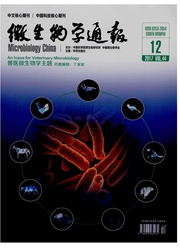

 中文摘要:
中文摘要:
主要介绍一种通过原位易错PCR构建随机突变文库的新技术。本实验室最近发表的一项国际专利中,利用来源于海栖热孢菌的极耐热性DNA连接酶,在传统PCR循环中加入一个连接步骤,即变性-退火-延伸-连接的四步循环法PCR,从而实现环状质粒的PCR指数扩增(PPCP)。原位易错PCR中所用引物为一段线性双链DNA,它含有与模板质粒不同的筛选标记,产物转化宿主菌后,模板质粒在筛选平板上被直接剔除。筛选到的阳性突变子可用作模板直接进入突变文库的再次构建,通过筛选获得二级或多级累加的正突变。利用这种方法构建了一个木聚糖酶基因和一个纤维素酶基因的随机突变文库,并筛选出具有正向突变的蛋白,证明以PPCP为基础的原位易错PCR技术,为基因定向进化提供了一种快速有效的随机突变文库构建的新方法。
 英文摘要:
英文摘要:
We developed a novel method to construct mutagenesis libraries via in situ error-prone PCR. One of our recent PCT patents described a novel method that adding a ligation step mediated by thermostablc Thermotoga maritima (Tma) DNA ligase to form the repeated PCR cycles of "denaturation-annealing-elongation-ligation", which allows exponential amplification of circular DNA. In this method, circular PCR products are generated by using a long dsDNA primer pair, which is designed to carry a selection marker different from the original selection marker of the template plasmid, the template plasmid carrying the original marker is eliminated when transformed host cells are cultured under the new selection pressure. If the product serves as the template for the next round of amplification, accumulation of positive mutations can be obtained by multiple rounds of in situ error-prone PCR. This method has been used to create random mutagenesis libraries of a xylanase gene and a cellulase gene. Screening of these libraries resulted in mutant proteins with desired properties, demonstrating the usefulness of in situ error-prone PCR for creating random mutagenesis libraries for directed evolution.
 同期刊论文项目
同期刊论文项目
 同项目期刊论文
同项目期刊论文
 Thermostable DNA ligase-mediated PCR production of circular plasmid (PPCP) and its application in di
Thermostable DNA ligase-mediated PCR production of circular plasmid (PPCP) and its application in di Crystal structures of S-adenosylhomocysteine hydrolase from the thermophilic bacterium Thermotoga ma
Crystal structures of S-adenosylhomocysteine hydrolase from the thermophilic bacterium Thermotoga ma Identification and refinement of two strong constitutive promoters for gene expression system of Sch
Identification and refinement of two strong constitutive promoters for gene expression system of Sch 期刊信息
期刊信息
